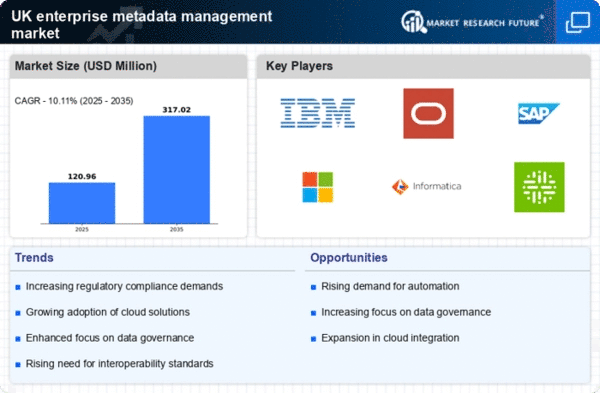Enhanced Data Integration Needs
As organisations in the UK increasingly adopt hybrid and multi-cloud environments, the need for effective data integration has become paramount. The enterprise metadata-management market is responding to this challenge by providing solutions that enable seamless integration of disparate data sources. Companies are recognising that a robust metadata management strategy is essential for achieving a unified view of their data assets. This is particularly relevant as research suggests that 70% of organisations struggle with data silos, which can hinder decision-making processes. Consequently, the demand for metadata management tools that facilitate data integration is expected to rise, further propelling the growth of the enterprise metadata-management market.
Rising Demand for Data Compliance
The enterprise metadata-management market is experiencing a notable surge in demand for data compliance solutions. With the implementation of stringent regulations such as GDPR, organisations are compelled to ensure that their data management practices align with legal requirements. This has led to an increased focus on metadata management as a means to track data lineage and maintain compliance. In the UK, businesses are investing heavily in technologies that facilitate data governance, with the market projected to grow at a CAGR of 12% over the next five years. This trend indicates that organisations are prioritising metadata management to mitigate risks associated with non-compliance, thereby driving growth in the enterprise metadata-management market.
Growing Importance of Data Quality
In the context of the enterprise metadata-management market, the emphasis on data quality is becoming increasingly critical. Organisations are realising that poor data quality can lead to erroneous insights and decision-making. As a result, there is a heightened focus on implementing metadata management practices that enhance data accuracy and reliability. In the UK, studies indicate that businesses lose approximately £15 million annually due to data quality issues. This financial impact is prompting organisations to invest in metadata management solutions that ensure high-quality data, thereby driving the enterprise metadata-management market forward. The correlation between data quality and business performance is likely to further fuel this trend.
Increased Investment in Data Analytics
The enterprise metadata-management market is benefiting from the rising investment in data analytics across various sectors in the UK. As organisations strive to leverage data for strategic decision-making, the need for effective metadata management becomes apparent. Metadata plays a crucial role in enhancing the usability of data analytics tools by providing context and meaning to data sets. With the UK market for data analytics projected to reach £16 billion by 2026, the demand for metadata management solutions that support analytics initiatives is likely to grow. This trend indicates that organisations are recognising the value of metadata in driving insights and fostering a data-driven culture, thereby propelling the enterprise metadata-management market.
Shift Towards Automation in Data Management
The enterprise metadata-management market is witnessing a shift towards automation as organisations seek to streamline their data management processes. Automation technologies are being integrated into metadata management solutions to reduce manual efforts and enhance efficiency. This trend is particularly relevant in the UK, where businesses are under pressure to optimise operations and reduce costs. The adoption of automated metadata management tools is expected to increase, as they offer capabilities such as automated data discovery and classification. This shift towards automation not only improves operational efficiency but also supports compliance and data governance initiatives, thereby contributing to the growth of the enterprise metadata-management market.
















